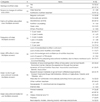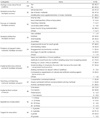Abstract
Tailored nutritional education is generally found to be more effective in changing behaviors and to be more fully implemented than a non-tailored equivalent. This study was conducted in order to develop tailored nutritional education materials on food additives in processed foods based on need and levels of knowledge of educational targets of elementary-school students in Seoul Metropolitan City. The focus group interview was conducted with six elementary-school nutrition teachers in order to gather information and to develop a tailored quantitative questionnaire for the survey. Based on the results from 138 nutrition teachers, all answered that education on food additives in processed foods for students is necessary and both teachers and students need to receive education regarding definition, safety, and use of food additives for each processed food, in the form of video, PPT, and teaching-learning plan. Nutritional education materials for two classes were developed using video clips (grocery shopping and cooking class) about food additives in processed foods, PPTs with activity papers, two teaching-learning plans, and school newsletters to parents. In conclusion, the current study warrants conduct of further studies short-term and long-term impacts and efficacy of tailored need-based nutrition education in promotion of healthy nutrition by conveying proper scientific knowledge regarding food additives in processed foods for elementary-school students.
Figures and Tables
References
1. Kim HY, Lee YJ, Hong KH, Ha SC, Ahn MS, Jo SJ, Kim KS. Intake of food additives in foods by total diet. Korean J Food Sci Technol. 1998; 30(4):767–774.
2. Ko MH, Kim JW. Seoul elementary school students' perception and information needs on artificial food colorants. Korean J Food Cookery Sci. 2011; 27(6):643–651.

3. Chang SO, Lee O, Lee KS. Intake of processed foods and the effects of nutrition label education in 5th grade children. J Korean Diet Assoc. 2008; 14(2):166–175.
4. Kim SM, Kim JW. Development of risk communication strategy and educational homepage on food additives. Korean J Community Nutr. 2010; 15(2):240–252.
5. Kim HJ, Jung KA. A study on the development and the effect of dietary life education program about 'processed foods' for elementary school students. J Korean Pract Arts Educ. 2010; 23(2):267–294.
6. Ministry of Health and Welfare, Korea Centers for Disease Control and Prevention. Report on The Korea National Health and Nutrition Examination Survey for 2010. Cheongwon: Korea Centers for Disease Control and Prevention;2011.
7. Kim JH, Lee S. Effects of short-term food additive nutrition education including hands-on activities on food label use and processed-food consumption behaviors: among 5th grade elementary school students. Korean J Community Nutr. 2011; 16(5):539–547.

8. Park YH, Kim HH, Shin KH, Shin EK, Bae IS, Lee YK. A survey on practice of nutrition education and perception for implementing nutrition education by nutrition teacher in elementary schools. Korean J Nutr. 2006; 39(4):403–416.
9. Park DY. Qualitative methods in food and nutrition research. Korean J Community Nutr. 2003; 8(6):1041–1046.
10. Kim YS, Lee MJ. Effects of nutrition education through social cognitive theory in elementary school students -focusing on the nutrition education of sugar intake-. Korean J Food Nutr. 2011; 24(2):246–257.

11. Chung SH. A research on the actual conditions of nutrition education activities by nutrition teachers of elementary schools in Seoul [master's thesis]. Yongin: Dankook University;2010.
12. Cheon JY. Comparative analysis of perception and needs for nutrition education between elementary school teachers and students [master's thesis]. Changwon: Kyungnam University;2011.
13. Park SJ. The development of teaching and learning guidance (TLG) of nutrition education: focusing on the 4th grade of elementary school [master's thesis]. Yongin: Yong In University;2008.
14. Huh ES. Evaluation of problem and nutritional education status for children's nutrition and the development of internet assisted nutritional education program for children's healthy dietary habit [dissertation]. Changwon: Changwon University;2006.
15. Kim KH, Choi S, Kim JW. Development of dietary education materials on food additives for elementary students. J Korean Pract Arts Educ. 2011; 24(2):65–82.
16. Yoon HS, Yang HL, Huh ES. Changes of nutrition knowledge in elementary school students by nutritional education program. Proceedings of the Korean Society of Community Nutrition Conference. 2000 Nov 18; Seoul: Korean Society of Community Nutrition;2000. p. 761.
17. Chang ES. The investigation of elementary school students' exposure to food additives through the published data and the development of education material [master's thesis]. Seoul: Kyung Hee University;2007.




 PDF
PDF ePub
ePub Citation
Citation Print
Print







 XML Download
XML Download